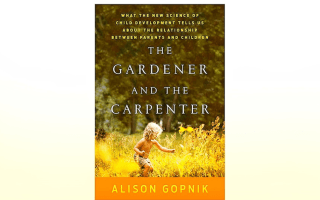You may, at first, balk at the title The Conscious Parent. The name might conjure preconceived notions of something esoteric and not immediately practical or actionable for busy mothers. However, the wise way Dr. Shefali Tsabary guides you in exploring your thoughts, reactions, and feelings (and triggers) will change your life. In The Conscious Parent: Transforming Ourselves, Empowering Our Children, Dr. Shefali gets to the root of parents’ issues.
Dr. Shefali’s book is a guide to yourself as well as to you as a parent. And, we don’t mean guide where she teaches you how to parent, but it’s a guide to yourself like a user’s manual to your mind. It might sound very “woo woo,” but there’s a takeaway for everyone. It’s a book you’ll highlight so much that you’ll stop highlighting. In fact, we’ve even recommended it to friends without kids because everyone has triggers and issues they want to examine and overcome.
Relinquishing our control issues
Control is a topic that comes up a lot regarding kids. Many books discuss the needs of kids to control their environment or the people around them, but they usually don’t cover parents’ need to control the outcome or behavior of their kids. Dr. Shefali sheds light on our resistance to our kids’ behavior or career choices when they don’t match our expectations. She explains, “…we imagine that if we are angry enough, sad enough, happy enough, or domineering enough, things will somehow change. The opposite is the case. Our inability to embrace our reality in its as is form keeps us stuck.”
However, Dr. Shefali shares with us that we need to do the opposite. “For this reason, not resistance but acceptance of our reality is the first step to changing it. Relinquishing control allows us to engage in life from the standpoint of seeking to learn. Indeed, to respond to life in its as is form is how our greatest lessons are learned. The key is to start with what is, not what isn’t.” She further explains that we need to acknowledge where our children are and meet them there instead of forcing them to be where it suits us.
Managing difficult emotions
Difficult emotions-ours and theirs-are often a significant source of grief itself. However, Dr. Shefali teaches that the only way we can process our emotions and help our kids process theirs is through sitting with these bad feelings and just feeling them-not pushing them down, not avoiding them, not rushing our kids through theirs. “For this reason, if we wish to teach our children how to live integrated lives in which they take full responsibility for their actions, we need to honor all their emotions… In this way they come to appreciate life as a seamless fabric in which every action and relationship is energetically connected.”
Learning from our own difficult emotions
We might think it’s our kids that we have to soothe or figure out, but in actuality, it’s us that needs to manage our feelings to set the tone. Dr. Shefali explains that we need to remain nonreactive and sit with our feelings and thoughts. And when we do, we show our kids that we don’t necessarily have to react or act out. She challenges us further and asks us to examine the feelings around these situations and learn something about ourselves. And through this modeling, we show our kids that they can do the same.
And we also need to endure these difficult feelings for our own growth. “As you learn to be with your emotions, they will no longer overwhelm you. In the full acceptance of surrender, which is of a quite different character from mere resignation, you come to see that pain is simply pain, nothing more and nothing less… However, when you don’t fuel your pain by either resisting or reacting, but sit with it, it transforms itself into wisdom. Your wisdom will increase in line with your capacity for embracing all of your feelings, whatever their nature. Along with increased wisdom comes a greater capacity for compassion.”
Mourning our former selves
But despite all that she touched upon, we’ve never felt more seen than when Dr. Shefali discusses mourning the loss of our former selves. As much as we try, we’ve transformed and cannot bring back the life we had before kids or the previous iteration of ourselves because both no longer exist. “No one tells us we will have to endure the death of our old self and that we will have no clue how to develop a new sense of who we are.”
She acknowledges how difficult this journey can have us question our competence as a parent and our decision to become one. But, she asks us to see this loss as “regenerative,” to slow down, develop patience and sit with these feelings. Only through this process, can we be present for our children. But don’t think for a second that she doesn’t understand our struggle to merely “get from one place to another without delay.”
Dr. Shefali gets to the root of parents’ issues
Dr. Shefali covers an array of topics in her concise book-from the reason we get triggered to why we may encounter the same issue over and over again. While the language is simple and easy to read, it’s meant to be digested slowly and parsed deliberately. And, it takes time to intently face your shortcomings and vulnerabilities. But, if you put in the work and time to really explore these issues, you come through it with clarity and peace in your heart. And, you’ll be less encumbered by the past so you can be present with your child. You’ll go through life a little more clearly and be able to parent a little more clearly to grow your relationship with your child and if you believe in such things, grow spiritually together. But no matter your beliefs, she will change your life.
If you want to learn more about Dr. Shefali, you can follow her on Instagram @doctorshefali, YouTube or visit her website where she even offers online coursework.







